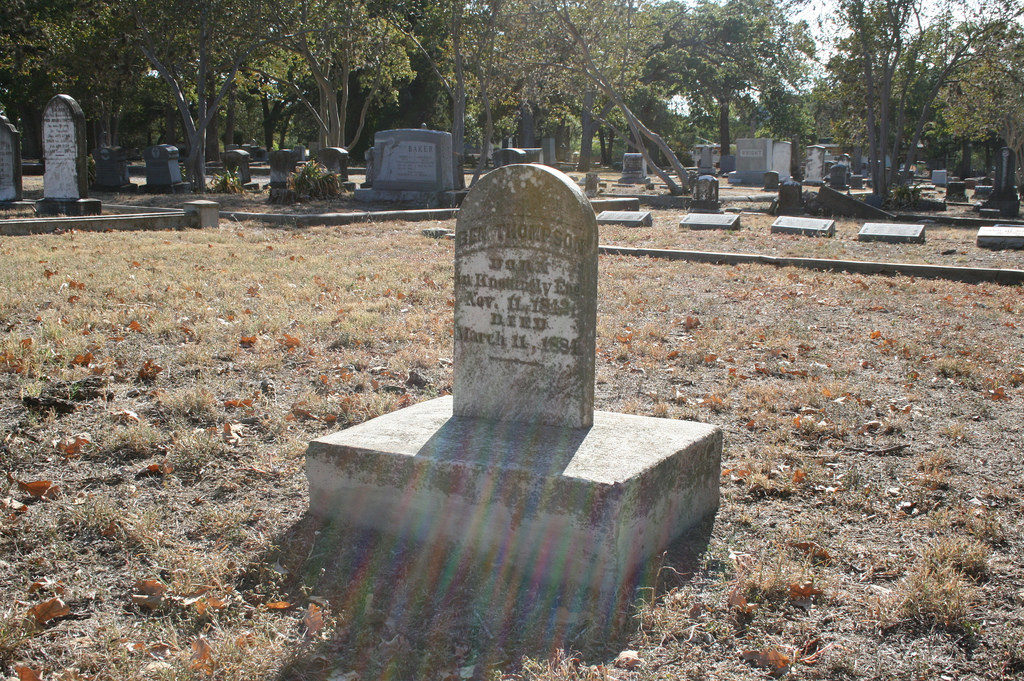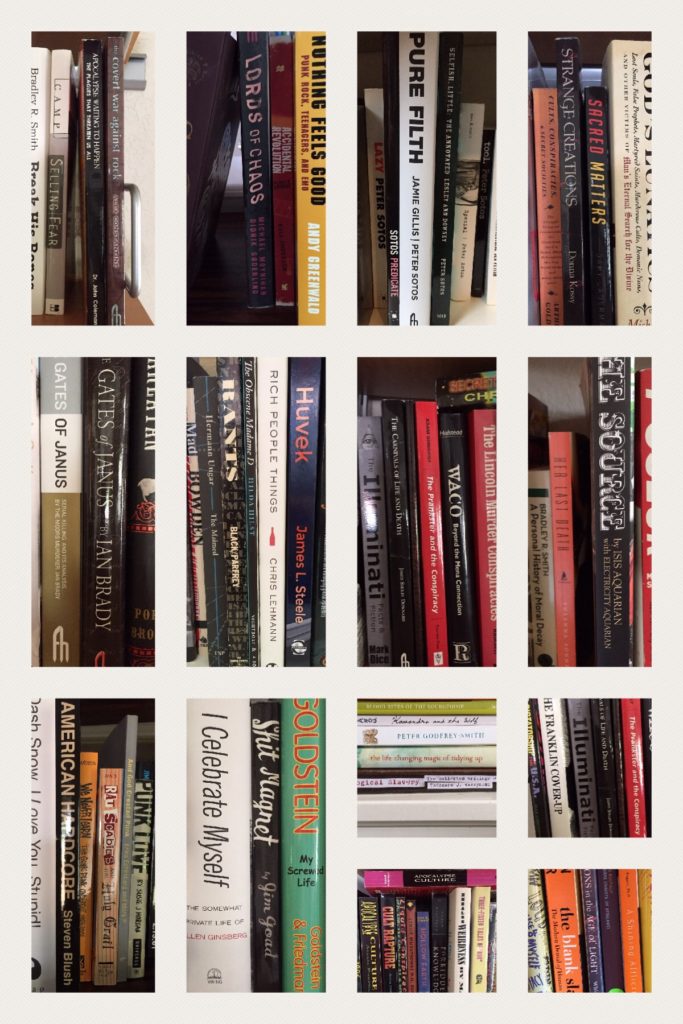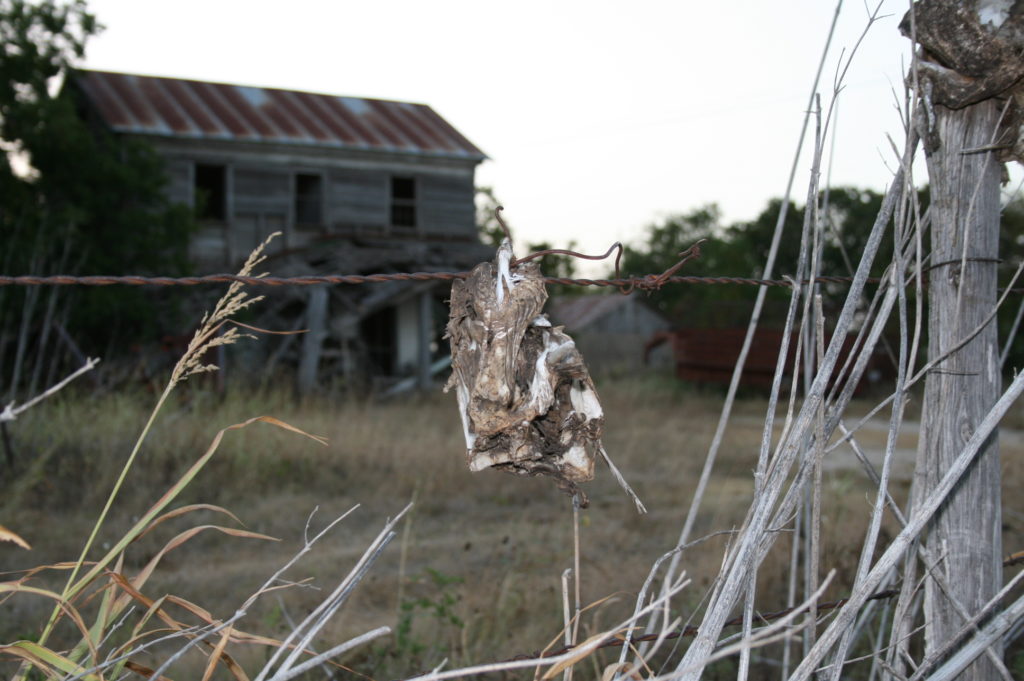Ben Thompson doesn’t have the level of posthumous fame as his exploits should have earned. I think it’s because he didn’t have a catchy nickname. In the early days of Texas statehood, among impulsive, gun-crazy men with a violent streak, he was first among equals. But fame is fickle and it’s hard to pin down why some gunslingers are well-remembered and why some become footnotes. In many regards, outside of Texas history buffs, Ben Thompson is a footnote.
Still, among lovers of Old West or Texas history, some of us do remember Ben Thompson and this is a perfect time of the year to share his story. He was a soldier and a lawman, but among Texas lawmen during the 1800s, it was not uncommon for lawmen to also be criminals, and Thompson was definitely a criminal, and a violent one at that. So violent was his life that some people interested in ghosts and the paranormal say the power of his character affects his final resting place.
Ben Thompson was like many of the wild men who made Texas their home – he was a jack of all trades before he found his niche as a gunslinger. Born in England in 1843, his family emigrated to Texas in 1851. In his teens, he worked as a printer’s apprentice and in 1859 he went to New Orleans to work as a bookbinder. It was in New Orleans that the man he was to become showed himself when he killed a man whom he claimed was abusing a woman. Stabbed him to death. He was fifteen or sixteen when this happened.
He served in the Civil War, fighting with the Confederates, but the battles he fought didn’t quell his love of guns and rough justice because after he returned to Austin he shot and killed a man during an argument over a mule. A mule. Seriously. And since the mule was technically Army property, Thompson was arrested. That didn’t slow him down though because he busted out of prison and fled to Mexico where he joined Maximillian’s forces until the good emperor lost the war in 1867. Clearly a man unable to function outside of conflict, Thompson returned to Austin and promptly shot his brother-in-law for abusing Thompson’s wife. Oh yeah, Thompson got married during his stint in the Civil War. The civilizing effects of marriage didn’t really take with him.
So, Thompson was tried and sent to prison in Huntsville, and this time he was unable to break out. He served two years of his four year sentence until pardoned by President Grant. Once free he headed up to Abilene, Kansas with his family and opened a prosperous saloon with an old Army buddy, Philip Coe, and seemed to be doing reasonably well. That changed when Thompson was in a terrible buggy accident that injured him, his son and his wife, who lost an arm. While Thompson was recovering from the accident, Coe went and got himself shot by Marshal “Wild Bill” Hickok.
By any measure Abilene of the early 1870s was a tough town, and its city marshal – James B. (Wild Bill) Hickok – was up to the challenge of taming its rowdy visitors. Although there may have been many reasons that Hickok and Philip Coe did not care for each other, it is likely that the basis for their dislike was a woman they both cherished. Apparently she chose the gambler over the lawman and was going to leave town with Coe – or so she thought. During the evening of October 5, 1871, Hickok shot Coe, who had been firing his pistol into the evening air on a street in Abilene. Tragically, in the confusion of the shots taken at Coe, Hickok also shot and killed his deputy. (Texas Cemeteries, Harvey)
After that, Abilene, Kansas was tired of Hickok and all the cattle drivers who passed through, making trouble at the drinking and gambling establishments, so they relieved Hickok of his duty and banned undesirables from entering or remaining in the city. That included Thompson so he went to Ellsworth, Kansas and began his time as a professional gambler. Interestingly, it was in Ellsworth that Thompson encountered another name we all remember more than poor Ben:
After the shooting of Coe, Ben Thompson left town for Ellsworth, Kansas, where he met Wyatt Earp in one of the Old West’s classic “in the streets” confrontations. Looking down the barrel of Earp’s gun, Thompson backed down and soon left Ellsworth for the Texas Panhandle. There Thompson would meet and, in the ensuing years, form a life-long friendship with Bat Masterson. (Texas Cemeteries, Harvey)
Interestingly, Thompson’s brother shot and killed the Ellsworth, Kansas sheriff and fled. A couple of years later he stood trial and was acquitted – the Thompson family seemed to be able to avoid the worst penalties for their impulsive and criminal natures, but so did a lot of men during that time. Rustle some cattle and you’d hang immediately if caught but shoot a sheriff and people could understand how the sheriff may have had it coming.
From 1874 to 1879, Thompson made his living as a professional gambler, traveling around various Texas cities, and of course he got into trouble as he did it. On Christmas Day, 1876, a fight broke out in the Austin Theater. Thompson, seeing a friend was causing the commotion, decided to help his friend out and jumped into the fray. When the theater owner emerged with a rifle and shot at Thompson, Thompson returned fire and killed him in three shots. It was determined later that Thompson had killed in self-defense.
Looking for quick money in the Colorado silver mines, Thompson went west and while there teamed up with his friend, Bat Masterson, who had assembled a team of hired guns to work for Kansas-based railroads that were embroiled in a right of way dispute with Colorado railroads. Thompson was well-paid for his efforts so he returned to Austin and opened a gambling saloon that he called the Iron Front Saloon. Here’s where it gets kind of funny: Ben Thompson was scrupulously honest in the way he ran his gambling tables and earned the respect of Austin citizens as being an honest man, so honest that the citizens in Austin elected him to be city marshal, not once, but twice. And the hell of it is, he was an honest man. He just liked shooting people. So why not have an honest shooter serve in law enforcement?
And it was a pretty good decision – plenty of people thought Ben Thompson was the best marshal Austin ever had. But rest assured he didn’t stop killing people. In 1882, Thompson visited the Vaudeville Theater in San Antonio and felt that the card tables at the establishment might not meet his level of scrupulous honesty and shot the theater owner, Jack Harris, to death. He was indicted for murder and resigned as marshal and it will surprise no one that he was acquitted of murder. Presumably the theater owner had it coming. Thompson returned to Austin and was given a hero’s welcome
Now, you and I, if we shot a popular entertainment establishment owner to death, we might be emboldened a bit if we returned home to the 1880s version of a ticker tape parade, but it takes a really bold person to return to the scene of the crime. Thompson went back to the Vaudeville Theater in 1884. He and his friend, John King Fisher, one helluva gunslinger in his own right, sauntered into San Antonio like they owned the place and news of their arrival spread quickly.
What happened inside the Vaudeville Theater depends on the sources. Some say that within minutes of entering the saloon area of the Vaudeville Theater, they were both ambushed and shot from behind. That’s some cowardly crap right there but, it must be said, that there would have been little chance for anyone to kill him in a straightforward gunfight. But other sources indicate that perhaps Thompson pushed things too far. He had already run into some of Jack Harris’ business partners inside the Vaudeville Theater, but stayed for the show and pressed his luck in the saloon
Thompson and Fisher had been drinking heavily in the saloon. Inside, Simms, Foster and three confederates were waiting. When the subject of the murder of Jack Harris came up, Fisher wanted to leave. But Thompson pushed on, eventually slapping Foster and putting a pistol in the saloon owner’s mouth. Almost immediately shooting broke the tension and silence of the room. As the smoke cleared, both Thompson and Fisher lay dead on the floor. Fisher had never drawn a gun, and Thompson managed but a single shot. Yet the bodies of the outlaw lawmen had nine and thirteen wounds, respectively. Ironically, a coroner’s jury in San Antonio ruled the killings self-defense. (Texas Cemeteries, Harvey)
Legends of the ambush grew far outside of the reality of what really happened. Texas history junkies talk of how it was that Ben Thompson killed six of the men who ambushed him with a single six-shooter and hit them each square like ducks in a carnival shooting game. The reality is that even in the scenario where he pressed his luck, he barely knew what hit him. I bet he’d have liked the way his own murder played out in terms of the myths that arose around him. But no one was ever charged with killing him, and his body was shipped back to Austin. He’s buried in Austin’s Oakwood Cemetery.
I first heard about Ben Thompson from a ghost hunter. I don’t hunt for ghosts, but I do like looking into ghost legends, and ghost hunters can be really helpful in finding out interesting stories. The lady I met told me that it was impossible to take a good photo of Ben Thompson’s gravestone because he hates the stone that was put on his resting place because it isn’t the one he won in a card game, so he makes sure all the photos people take are marred in some manner.
Bear with me, this story has some merit. The late Charley Eckhardt wrote up a lot of what he knew about some of the better and more interesting Texas legends and he wrote a short article about how it was that Ben Thompson won his tombstone in a card game. One night a tombstone salesman named Luke Watts played poker at a table at Iron Front Saloon and it just so happened that Ben Thompson was playing that night at that table as well. Watts tried to sell Ben Thompson a tombstone, but Thompson didn’t seem too interested. But when Watts had lost every penny in his pocket, Thompson’s demeanor changed.
Watts was not as good a poker player as he thought he was, and sometime after midnight he announced that he was cleaned out and was leaving the game. Thompson asked him how much his tombstones were worth. “It depends on what kind it is,” Watts replied.
Thompson said he wanted the best tombstone Watts had. Watts told him he had a fine marble stone that was worth $200. Thompson told him to bring it up and put it in the game. Thompson would accept it in lieu of $200 cash. The game began again and Thompson won the tombstone. Watts suggested that he carve at least Thompson’s name and date of birth on it, but Thompson said no. The stone sat in the poker room in the Iron Front for a few months, until Thompson ordered it moved to the basement.
Not long after this Ben Thompson died in the ambush in San Antonio, but according to Eckhardt his resting place in Oakwood Cemetery lacked a headstone until 1925, and that the tombstone he won remained in the basement of the Iron Front Saloon until it was demolished. Eckhardt wasn’t certain if the stone that was eventually placed on his grave was the stone he won in the card game.
I don’t know one rock from another but the stone that marks Ben Thompson’s resting place does not look like it’s fine marble and I don’t think that anyone was too pressed to rescue a slab of marble from the basement of a saloon marked for demolition.
Oakwood Cemetery is a favorite of mine and many others in the area. I spent a lot of time there searching for the burial places of the victims of the Servant Girl Annihilator, and while I was there years ago, I remembered that legend the ghost hunter told me and I took a photo of Ben Thompson’s gravestone.

And there you go. Maybe Ben really is angry about his stone and interferes with good pictures.
Join me under the cut as I behave like the killjoy I so often am.





